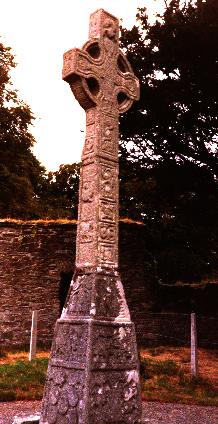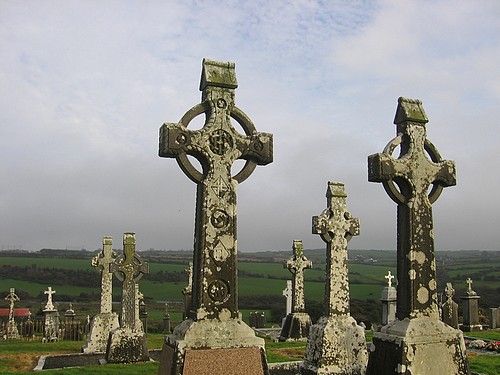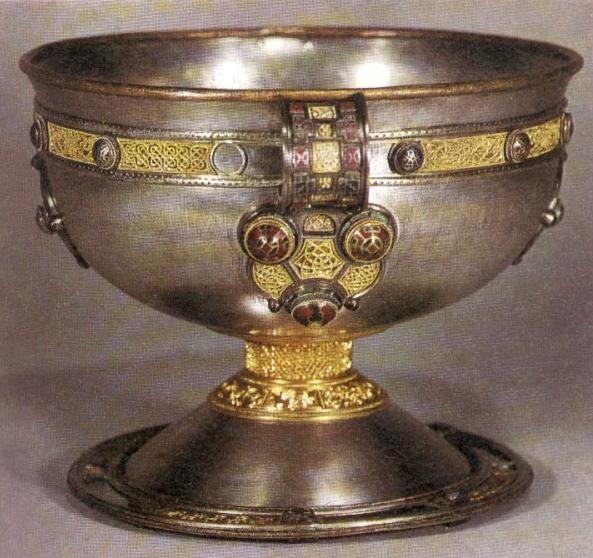


Early architecture and art
Prehistoric Ireland
Prehistoric (late Stone Age) Ireland
Overview and outside of Newgrange (a passage grave in Co. Meath dating from about 3,200 BC)
Entrance and ornamental stone at Newgrange
Prehistoric stone fort – Dún Aengus – at a cliff edge on Inishmore (largest of the Aran Islands)
Overview of the Hill of Tara, reputedly the seat of the high kings of Ireland. It contains a passage mound from about 3,000-2,500 BC. The second photo shows Lough Gur near Limerick near which a stone circle is located.
Stone circles (left) near Lough Gur, Co. Limerick and (right) near Glandore, Co. Cork (Drombeg)
Poulnabrone Dolmen (Burren, Co. Clare) and Staiguefort (near Castlecove, Co. Kerry)
Reconstructed crannogs (late Stone Age hut dwellings built out on a lake) in Tay, Scotland and in Ferrycarrig, Co. Wexford (Irish National Heritage Park)
Pre-Celtic and early Celtic Ireland
Among the earliest artefacts from the early Bronze Age is the disc of beaten gold from Tedavnet, Co. Monaghan, it is one of about twelve such known discs from Ireland.
From the late Bronze Age (after the Stone Age and before the Iron Age, probably early in the first millennium BC) there are some artefacts which have been found. Two examples are shown here, both items of gold jewellery worn around the neck.
Left: Torque found near Belfast, right: gorget (collar) found at Gleninsheen, Co. Clare
Gold dress fastener found at Clones, Co. Monaghan and set of armlets
The archaeological remains of the early Celts in Ireland are not very numerous and contrast starkly with the amount of Celtic material found in Europe from the first millennium BC. The later material contains such well-known artefacts as the Gundestrup Cauldron called after the location in Denmark where it was found in 1891. Like the Turoe Stone, this decorated vessel is in the La Tène style and dates from the first centuries BC.
Gundestrup Cauldron from Denmark with Celtic figures on the outside; Irish Bronze Cauldron, c. 600 B.C.
Celtic idol with two faces (Janus form) in Caldragh graveyard on Boa Island in Lower Lough Erne, Co. Fermanagh from the early Celtic period in Ireland (probably middle of first millennium BC)
Turoe Stone from Loughrea, Co. Galway. It is decorated in the La Tène style and dates from approximately 200 BC.
Early Christian Ireland
Early monastic islands of the Skelligs off the coast of Co. Kerry
Gallarus Oratory and Kilmalkedar Church (both Dingle Peninsula, Co. Kerry)
Beehive huts (both Dingle Peninsula, Co. Kerry)
Early monastic settlement of Clonmacnoise on the River Shannon (centre of Ireland on the River Shannon)
High crosses
High crosses at Clonmacnoise and Monasterboice, Co. Louth (Muiredeach’s Cross)
Details of Muiredeach’s Cross at Monasterboice, Co. Louth
Ahenny, Co. Tipperary (South Cross) and Castledermot Cross, Co. Kildare
High Cross at Moone, Co. Kildare, with detail of Daniel in the Lions’ Den
Celtic crosses in Irish graveyards
Architecture around the Viking period
Round towers at Ardmore, Co. Waterford and Glendalough, Co. Wicklow
St. Kevin’s Church at Glendalough, Co. Wicklow
Views of the Rock of Cashel, south Co. Tipperary
View of the Rock of Cashel with nearby monastery
Reginald’s Tower and City Walls (both Waterford city)
Norman churches and castles in Ireland
Views of Norman abbey at Gowran, Co. Wexford
Views of Norman abbey at Jerpoint, Co. Kilkenny
Views of Norman castle at Trim, Co. Meath
Castlefergus Castle, Co. Antrim, north of Belfast and St. John’s Castle. Limerick
Norman keeps in the Irish countryside
Early Celtic art
Much of the material which documents early Celtic art was found in so-called ‘hoards’ (in the second half of the first millennium AD – much like the illuminated manuscripts, see the manuscripts module). These hoards are finds of artistic artefacts in the ground somewhere in the Irish countryside.
The Broighter Hoard
The hoard with the earliest material is the Broighter Hoard which was discovered in 1896 by someone ploughing at Broighter, Co. Derry. Among the items of the hoard are a tubular collar and a model ship, both in gold. The material probably dates from the first cenutry BC and is in the La Tène style.
Two views of the Broighter tubular collar
Left: The model ship of beaten gold from the Broighter Hoard, right: commemorative coin
Among the most impressive hoards is the Ardagh Hoard, found accidentally in 1868 by two farmers working a field within a ring fort (Irish rath) at Reerasta, near the village of Ardagh, Co. Limerick. This hoard consists four ornate brooches, a small bronze chalice and, most importantly, the larger chalice, now simply known as the Ardagh Chalice. The chalice is about six inches tall and can be viewed in the National Museum of Ireland.
Ardagh Chalice, overall view and underside
Ardagh Chalice, details
Another significant find is the Derrynaflan Hoard, discovered in 1980 on the site of an old monastery at Derrynaflan, Co. Tipperary. It considers of five artefacts, including another decorative chalice, similar in form to the Ardagh chalice.
Site of Derrynaflan in Co. Tipperary
Derrynaflan chalice and hoard
Early Celtic decorative torques (first few centuries BC)
The so-called ‘Petrie Crown‘, first century A.D. (it is not certain whether this artefact served as a crown)
Early 7th century brooch
Tara brooch (early 8th century), head and detail. Note: the Tara brooch was not found at the Hill of Tara (see above) but on the seashore near Laytown, Co. Meath.
Clocmacnoise Crozier (12th/14th century) and the Cross of Cong, south Co. Mayo (early 12th century)
Pre-Celtic and early Celtic Ireland
Early Christian Ireland
High crosses
Viking Ireland
Norman Ireland
Early Celtic art
References












.jpg)


.jpg)
.jpg)
.jpg)














.jpg)















.jpg)
.jpg)














The Ardagh Hoard





The Derrynaflan Hoard



Further decorative items




.jpg)




References
There are many books on early Celtic culture and on Irish architecture and art which one could cite here, the following are just a few references which users of this website might find interesting to consult.
 |
Green, Miranda J. 1992. Dictionary of Celtic Myth and Legend. London: Thames and Hudson. |
 |
McKillop, James 1998. Dictionary of Celtic Mythology. Oxford: University Press. |
 |
Herity, Michael and George Eogan 1996. Ireland in Prehistory. London: Routledge. |
 |
Harbison, Peter 1995 Pre-Christian Ireland. From the first settlers to the early Celts. London: Thames and Hudson. |
 |
Mitchell, Frank and Michael Ryan 2001. Reading the Irish Landscape. Dublin: Townhouse. |
 |
Charles-Edwards, T. M. 2000 Early Christian Ireland. Cambridge: University Press. |
 |
Boltin, Lee (ed.) 1977. Treasures of Early Irish Art, 1500 B.C. to 1500 A.D.: From the Collections of the National Museum of Ireland, Royal Irish Academy, Trinity College, Dublin. New York: Metropolitan Museum of Art. |
 |
Arnold, Bruce 1977. A Concise History of Irish Art. London: Thames and Hudson. |
.jpg) |
Fitz-Simon, Christopher 1982. The Arts in Ireland. A Chronology. Dublin: Gill and Macmillan. |
Further references
Bhreathnach, Edel (ed.) 2006. The Kingship and Landscape of Tara. Dublin: Four Courts Press.
de Paor, Máire and Liam 1978. Early Christian Ireland. London: Thames and Hudson.
Harbison, Peter 1992. The High Crosses of Ireland: An Iconographical and Photographic Survey. Bonn: Habelt.
Henry, Françoise, 1965. Irish Art in the Early Christian Period (to 800 A.D.). London.
Henry, Françoise 1967. Irish Art during the Viking Invasions (800-1020 A.D.). London.
Hourihane, Colum P. (ed.) 2004. Irish Art. Historical Studies in Honour of Peter Harbison. Dublin: Four Courts Press.
Ó hÓgáin, Dáithí 1999. The Sacred Isle: Belief and Religion in Pre-Christian Ireland.. Woodbridge, Suffolk: Boydell and Brewer
O’Sullivan, Aidan. 1998. The Archaeology of Lake Settlement in Ireland. Dublin: The Royal Irish Academy.
Smyth, Alfred P. (ed.) 2000. Seanchas. Studies in early and medieval Irish archaeology, history and literature in honour of Francis J. Byrne. Dublin: Four Courts Press.
Stout, Matthew 2000. The Irish Ringfort. Dublin: Four Courts Press.
Waddell, John. 1998. The Prehistoric Archaeology of Ireland. Galway: Galway University Press.
